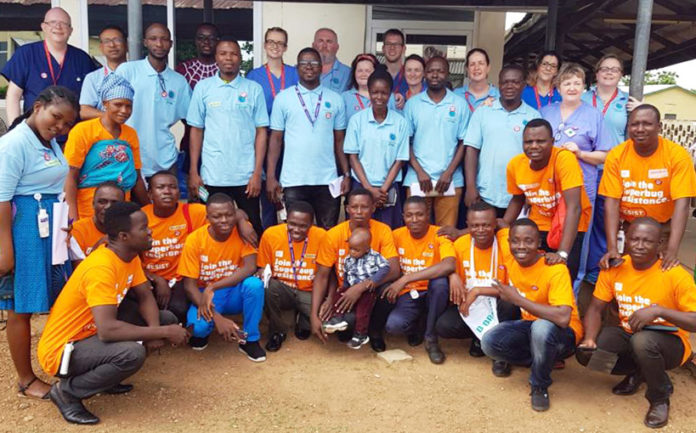
VOLUNTEERS from the University of Limerick (UL) and the UL Hospitals Group (ULHG) have returned from Africa after completing a life-saving skills training mission for healthcare workers in Ghana.
The three-year programme saw the Limerick volunteers provide emergency care skills training for healthcare workers in community health facilities and hospitals in the remote Upper West region of the African nation.
Chief Operations Officer of UL Hospitals Group, Noreen Collins, said, “Humanitarian volunteering is a key part of the Group’s strategy, establishing links with the developing world in a sustainable, targeted and meaningful way.
Learning for Life (LFL) Ghana has provided 240 Community Health Planning and Services (CHPS) workers with basic life saving skills and delivered specialist instruction in hand hygiene, physiotherapy, sepsis, nutritional and neonatal care to both the community and hospital staff.
The team also established a 30 member local training unit, including eight super trainers, to ensure continuity and sustainability of training and paving the way for a positive transformation of healthcare standards.
Assistant Director of Nursing at Croom Orthopaedic Hospital, Katie Sheehan, who has been with LfL Ghana from the beginning, said she was unprepared for how swiftly the local CHPS workers would take charge of the training programme.
“I never thought we would get quite so far, so soon. The eight super trainers have made a huge difference. They were delivering programmes and supervising trainees with only minimal input from us. We independently validated their testing, and our marks were identical to theirs,” she stated.
The initiative was a two way exchange of ideas and the Limerick team were frequently astounded at the at the ingenuity of their Ghanaian counterparts.
Senior Physiotherapist and Practice Tutor at UHL Mary Flahive and Senior Physiotherapist at Croom Orthopedic Hospital Rosalie Stack said they were “blown away” by the innovative work of physiotherapy staff at the hospitals. This was despite the lack of budget for essential equipment for children with Cerebral Palsy, make standing frames and customised chairs from reinforced cardboard.
LfL Ghana team members say they are focusing on the future as they prepare their final report to make a case for extending ancillary programmes in nutrition, paediatrics, neonatal care, and physiotherapy.





